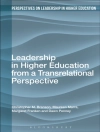The governance of education in many countries and regions of the world is currently in transition, challenging histories, remaking subjectivities and shaping possible futures. This book provides an up to date analysis and discussion of the cutting edge theme of educational governance from an international comparative perspective. The volume explores the landscape of educational governance in its broadest sense; considering new forms of steering, leadership and management, assessment and evaluation, teaching and learning, knowledge creation and the realities and possibilities for different forms of political engagement. The new spatial dynamics of education are explored in institutional settings such as schools and universities and via professional groupings such as teachers, administrators and leaders. The chapters in this book are based on the best peer reviewed papers and keynote speeches, which were delivered at the XXVI Conference of the Comparative Education Society in Europe(CESE) in June 2014 in Freiburg, Germany. Comparative Education is uniquely situated to explore the emerging dynamics of educational governance within changing and newly emerging educational spaces because it provides the opportunity to learn more about different local, national or regional educational processes and trajectories and to share knowledge about the logics, ideologies and impacts of different techniques and regimes of governance across Europe and beyond. Hans-Georg Kotthoff is Professor of Comparative Education and School Pedagogy at the University of Education Freiburg, Germany, and President of the Comparative Education Society in Europe (CESE) since 2012. Eleftherios Klerides is Lecturer in Comparative Education and History of Education at the University of Cyprus and the Secretary-Treasurer of the Comparative Education Society in Europe (CESE).
สารบัญ
Preface.- Researching Governance in Education: Synergies and Future Research Agendas.- Section I: Governing Education: the Role of Data, Evidence, and Accountability.- Working Knowledge: Data, Expertise and Inspection in the Governing of Education.- Comparing Accountability Policy Tools and Rationales: Various Ways, Various Effects.- Section II: Governing Schooling and Schools.- Locating Governmentality in the Spread of Educational Leadership.- The Pastoral Supervision of Globalised Self-Technologies.- What is the Purpose of School Inspections? Functional Determination of School Inspection beyond Control.- Section III: Governing Teachers and Teacher Education.- Governing Teachers: Professional Development and Curriculum Reform in the Republic of Cyprus.- Governing Teacher Education through Digital Media: A Comparative Perspective on Policy Scales and Translations.- Section IV: European and Global Networks of Educational Governance.- European Educational Governance and its Influence on the Development of Slovenian Educational Space.- The OECD Directorate for Education as an Independent Knowledge Producer through PISA.- Section V: Governing Research and Knowledge.- Doctoral Studies in Italy: Old Cultural Traditions and New Governing Pressures.- Governing Knowledge through Language? Some Challenges for Comparative Education.- About the Authors.












